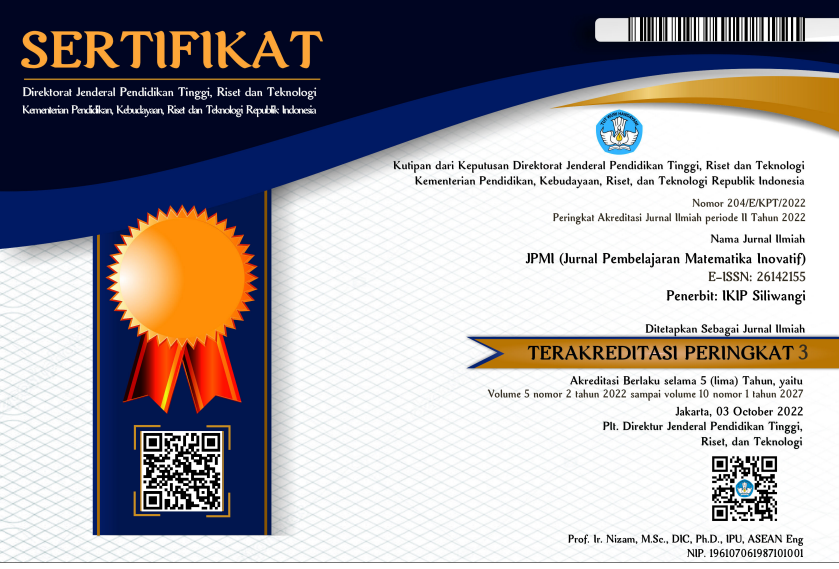Peningkatan kemampuan pemecahan masalah siswa kelas VIII menggunakan model PjBL berbasis GRASPS
DOI:
https://doi.org/10.22460/jpmi.v7i3.23504Keywords:
GRASPS, Mathematical Problem Solving Ability, Project Based LearningAbstract
Mann Whitney test sig value (2-tailed) 0.00. This means that the GRASPS-based PjBL model significantly improves junior high school students' skills in solving mathematical problems. The integrated learning process involving projects allows students to relate mathematical concepts to real situations, strengthen their understanding of the topics studied, and develop problem-solving and collaboration skills. In conclusion, the improvement of mathematical problem solving skills of VIII grade students whose learning uses the GRASPS-based PjBL model is better than those who use ordinary learning. The implication of this research is the importance of developing learning strategies that encourage active student involvement, linking learning with real contexts, such as problem solving and collaboration in the context of mathematics education.
References
Amalinda, N., Irianto, W. S. G., & Herwanto, H. W. (2017). Hubungan penerapan metode pembelajaran Project Based Learning berbasis GRASPS berbantuan modul digital dan hasil belajar siswa pada mata pelajaran produktif Multimedia di SMKN 1 Amuntai. Universitas Negeri Malang.
Carlson, D. L., & Marshall, P. A. (2009). Learning the Science of Research, Learning the Art of Teaching: Planning Backwards in a College Genetics Course. Bioscience Education, 13(1), 1–9. https://doi.org/10.3108/beej.13.4
Dewi, M. R. (2022). Kelebihan dan kekurangan Project-based Learning untuk penguatan Profil Pelajar Pancasila Kurikulum Merdeka. Inovasi Kurikulum, 19(2), 213–226. https://doi.org/10.17509/jik.v19i2.44226
Dewi, S. N., & Minarti, E. D. (2018). Hubungan antara self-confidence terhadap matematika dengan kemampuan pemecahan masalah matematik siswa pada materi lingkaran. Mosharafa: Jurnal Pendidikan Matematika, 7(2), 189–198. http://journal.institutpendidikan.ac.id/index.php/mosharafa
Gunantara, G., Suarjana, I. M., & Riastini, P. N. (2014). Penerapan model pembelajaran problem based learning untuk meningkatkan kemampuan pemecahan masalah matematika siswa kelas V. Mimbar PGSD Undiksha, 2(1). https://ejournal.undiksha.ac.id/index.php/jjpgsd/article/view/2058
Hendriana, H., Rohaeti, E. E., & Sumarmo, U. (2017). Hard skills dan soft skills matematik siswa. Bandung: Refika Aditama, 7.
Hidayat, W., & Sariningsih, R. (2018). Kemampuan pemecahan masalah matematis dan adversity quotient siswa SMP melalui pembelajaran open ended. JNPM (Jurnal Nasional Pendidikan Matematika), 2(1), 109–118. https://dx.doi.org/10.33603/jnpm.v2i1.1027
Lu, H., & Teng, D. (2022). SAROPAS: A competency-based performance tasks design model. Education and New Developments, 304–307. https://doi.org/10.36315/2022v2end069
Lubis, S. D., & Rangkuti, R. K. (2020). Upaya meningkatkan kemampuan berpikir kreatif dan kemampuan pemecahan masalah matematis siswa dengan menggunakan model pembelajaran project based learning di kelas VIII SMP Negeri 32 Medan. Al-Khawarizmi: Jurnal Pendidikan Matematika, 1(1), 75–86. https://ejurnal.univalabuhanbatu.ac.id/index.php/al-khawarizmi/article/view/145/116
Lukman, H. S., Setiani, A., & Agustiani, N. (2023). Pengembangan instrumen tes kemampuan pemecahan masalah matematis berdasarkan teori krulik dan rudnick: Analisis validitas konten. Jurnal Cendekia: Jurnal Pendidikan Matematika, 7(1), 326–339. https://doi.org/10.31004/cendekia.v7i1.1761
Marande, G. M. S., & Diana, H. A. (2022). Design research: pengembangan lintasan belajar dalam pembelajaran matematika realistik untuk meningkatkan kemampuan pemecahan masalah matematis. FIBONACCI: Jurnal Pendidikan Matematika Dan Matematika, 8(1), 31–46. https://doi.org/10.24853/fbc.8.1.31-46
Nardo, D. F., Jalinus, N., & Arwizet, K. (2019). Penerapan project based learning berbasis GRASPS untuk meningkatkan hasil belajar siswa pada mata diklat MPMB kelas XI SMK Semen Padang tahun ajaran 2016/2017. Jurnal Vokasi Mekanika (VoMek), 1(1), 20–26. http://vomek.ppj.unp.ac.id/index.php/vomek/article/view/26/7
Russeffendi, E. T. (2010). Dasar-dasar penelitian pendidikan dan bidang non-eksakta lainnya. Tarsito.
Sulastri, S., & Cahyani, G. P. (2021). Pengaruh project based learning dengan pendekatan STEAM terhadap kemampuan berpikir kritis pada pembelajaran online di SMK Negeri 12 Malang. Jurnal Pendidikan Akuntansi (JPAK), 9(3), 372–379. https://doi.org/10.26740/jpak.v9n3.p372-379
Velasco, M. J. M. (2022). Online Contextualized Performance Task-Based Assessment Using GRASPS Model in Science, Technology, and Society. International Journal of Research Publications, 104(1), 130–141. https://www.ijrp.org/paper-detail/3475
Wahab, A., Junaedi, J., & Azhar, M. (2021). Efektivitas pembelajaran statistika pendidikan menggunakan uji peningkatan n-gain di PGMI. Jurnal Basicedu, 5(2), 1039–1045. https://doi.org/10.31004/basicedu.v5i2.845
Wiggins, G., & McTighe, J. (2012). Understanding by design guide to advanced concepts in creating and reviewing units. ASCD.
Wren, D. G. (2019). Assessing deeper learning: Developing, implementing, and scoring performance tasks. Rowman & Littlefield.
Zakiyah, S., Hidayat, W., & Setiawan, W. (2019). Analisis kemampuan pemecahan masalah dan respon peralihan matematik dari SMP ke SMA pada materi SPLTV. Mosharafa: Jurnal Pendidikan Matematika, 8(2), 227–238. https://journal.institutpendidikan.ac.id/index.php/mosharafa/article/view/555/497
Downloads
Published
Issue
Section
License

This work is licensed under a Creative Commons Attribution-ShareAlike 4.0 International License.
The author is responsible for acquiring the permission(s) to reproduce any copyrighted figures, tables, data, or text that are being used in the submitted paper. Authors should note that text quotations of more than 250 words from a published or copyrighted work will require grant of permission from the original publisher to reprint. The written permission letter(s) must be submitted together with the manuscript.
















